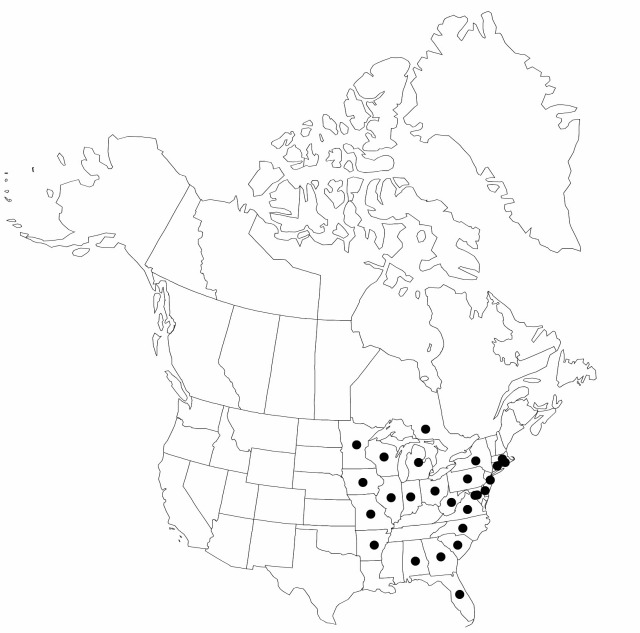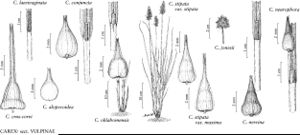Difference between revisions of "Carex laevivaginata"
in N. L. Britton and A. Brown, Ill. Fl. N. U.S. ed. 2, 1: 371. 1913.
FNA>Volume Importer |
imported>Volume Importer |
||
| (6 intermediate revisions by 2 users not shown) | |||
| Line 1: | Line 1: | ||
{{Treatment/ID | {{Treatment/ID | ||
|accepted_name=Carex laevivaginata | |accepted_name=Carex laevivaginata | ||
| − | |accepted_authority=(Kükenthal) Mackenzie | + | |accepted_authority=(Kükenthal) Mackenzie |
|publications={{Treatment/Publication | |publications={{Treatment/Publication | ||
|title=in N. L. Britton and A. Brown, Ill. Fl. N. U.S. ed. | |title=in N. L. Britton and A. Brown, Ill. Fl. N. U.S. ed. | ||
| Line 7: | Line 7: | ||
|year=1913 | |year=1913 | ||
}} | }} | ||
| − | |basionyms={{Treatment/ID/ | + | |special_status={{Treatment/ID/Special_status |
| + | |code=F | ||
| + | |label=Illustrated | ||
| + | }}{{Treatment/ID/Special_status | ||
| + | |code=E | ||
| + | |label=Endemic | ||
| + | }} | ||
| + | |basionyms={{Treatment/ID/Basionym | ||
|name=Carex stipata var. laevivaginata | |name=Carex stipata var. laevivaginata | ||
|authority=Kükenthal | |authority=Kükenthal | ||
| + | |rank=variety | ||
| + | |publication_title=in H. G. A. Engler, Pflanzenr. | ||
| + | |publication_place=20[IV,38]: 172. 1909 | ||
}} | }} | ||
|synonyms= | |synonyms= | ||
| Line 26: | Line 36: | ||
|elevation=0–1500 m | |elevation=0–1500 m | ||
|distribution=Ont.;Ala.;Ark.;Conn.;Del.;D.C.;Fla.;Ga.;Ill.;Ind.;Iowa;Md.;Mass.;Mich.;Minn.;Mo.;N.J.;N.Y.;N.C.;Ohio;Pa.;R.I.;S.C.;Va.;W.Va.;Wis. | |distribution=Ont.;Ala.;Ark.;Conn.;Del.;D.C.;Fla.;Ga.;Ill.;Ind.;Iowa;Md.;Mass.;Mich.;Minn.;Mo.;N.J.;N.Y.;N.C.;Ohio;Pa.;R.I.;S.C.;Va.;W.Va.;Wis. | ||
| − | |discussion=<p>Carex laevivaginata is readily distinguished from all other species in the section by the thickened, yellow sheath apex and the papillose, epistomic leaves.</p> | + | |discussion=<p><i>Carex laevivaginata</i> is readily distinguished from all other species in the section by the thickened, yellow sheath apex and the papillose, epistomic leaves.</p> |
|tables= | |tables= | ||
|references= | |references= | ||
| Line 35: | Line 45: | ||
-->{{#Taxon: | -->{{#Taxon: | ||
name=Carex laevivaginata | name=Carex laevivaginata | ||
| − | + | |authority=(Kükenthal) Mackenzie | |
| − | |authority=(Kükenthal) Mackenzie | ||
|rank=species | |rank=species | ||
|parent rank=section | |parent rank=section | ||
| Line 49: | Line 58: | ||
|publication title=in N. L. Britton and A. Brown, Ill. Fl. N. U.S. ed. | |publication title=in N. L. Britton and A. Brown, Ill. Fl. N. U.S. ed. | ||
|publication year=1913 | |publication year=1913 | ||
| − | |special status= | + | |special status=Illustrated;Endemic |
| − | |source xml=https:// | + | |source xml=https://bitbucket.org/aafc-mbb/fna-data-curation/src/2e0870ddd59836b60bcf96646a41e87ea5a5943a/coarse_grained_fna_xml/V23/V23_460.xml |
|genus=Carex | |genus=Carex | ||
|section=Carex sect. Vulpinae | |section=Carex sect. Vulpinae | ||
Latest revision as of 21:40, 5 November 2020
Plants with basal sheaths of previous year not persistent. Culms to 80 cm × 2 mm, scabrous throughout. Leaves: sheaths all with blades, fronts smooth, lacking spots, veinless, apex yellow, thickened, truncate, cartilaginous, entire; ligules acute, 5 mm, free limb to 0.5 mm; blades yellow-green, epistomic, to 60 cm × 6 mm, papillose adaxially (25X). Inflorescences densely spicate, cylindric, elongate, with 6–15 distinguishable branches, 3–6 × 1.5 cm; proximal internode to 10 mm; proximal bracts setaceous, apparent. Scales hyaline. Perigynia pale brown, red-brown distally, with red-brown veins, 10–12-veined abaxially, 7-veined adaxially, to 6 × 2.6 mm, base slightly distended proximally, cordate; stipe to 0.2 mm; beak to 2.5 mm, margins serrulate. Achenes ovate, 2 × 1.3 mm; stalk to 0.3 mm; persistent style base cylindric, 0.3 mm. 2n = 46.
Phenology: Fruiting May–Jun.
Habitat: Seasonally saturated or inundated soils in wet meadows, marshes, edges of tidal marshes, swamps, or alluvial bottomlands, particularly on calcareous substrates
Elevation: 0–1500 m
Distribution

Ont., Ala., Ark., Conn., Del., D.C., Fla., Ga., Ill., Ind., Iowa, Md., Mass., Mich., Minn., Mo., N.J., N.Y., N.C., Ohio, Pa., R.I., S.C., Va., W.Va., Wis.
Discussion
Carex laevivaginata is readily distinguished from all other species in the section by the thickened, yellow sheath apex and the papillose, epistomic leaves.
Selected References
None.
